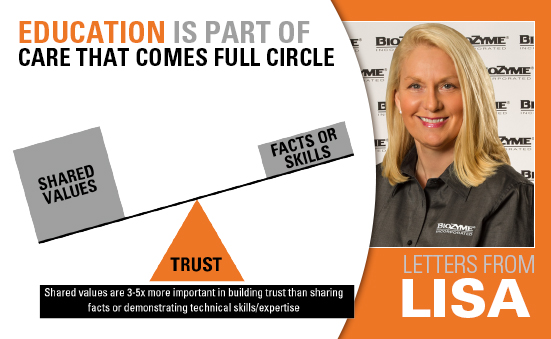Education is Part of Care that Comes Full Circle.
At the risk of singing to the choir, I am going to attempt to share how all of us can educate others about our industry and the importance of what we do using “care that comes full circle” as our guide.
According to a study conducted by The Center for Food Integrity, 56% of consumers say they know just a little bit about the farming practices that produce their food, but 80% want to know more. More than half are interested in affordable, healthy food and are confident in its safety. Unfortunately, that means half are not. Stats specific to livestock found that 38% desire meat that is derived from humanely treated animals, while 48% are unsure if that is important to them or not. In addition, 54% are concerned about antibiotic residues in their food.
The study also found that trust is the key to consumers when it comes to sharing information (educating). What drives this trust? Shared values.
A good example of doing this is found in a response by a veterinarian mother.
“Hello, I’m Dr. Dorman! As the mother of three children, it is vitally important to me to ensure that antibiotics are effective when I need them most: when one of my kids is sick. As a veterinarian, I also recognize the importance of antibiotics to the welfare of animals. I took an oath to protect animal health, prevent animal suffering, and to promote human health. Remaining true to this oath is very important to me.”
With these stats and insight, the question is how do each of us educate and then advocate for our industry? I believe the three thoughts below uses a “care that comes full circle” approach. In other words, it is based on the idea that if we take care in our approach to educate; the other party will care enough to listen back with an open mind due to shared values.
- Listen without judgment to their values to find out what is important to them.
- Ask questions to acknowledge their perspective and then dig deeper to show you want to understand things more, while trying hard not to comment back or use a defensive tone in any way.
- Share your perspective through your values and then use resources that have supporting information to that perspective.
If you are interested in seeing this approach in action, you can watch a helpful video that AFIA produced at https://vimeo.com/219907731/df206803cd.
Interestingly enough, this approach is just as useful with things around your business. That might be a great place to practice this approach.
Whether training employees or teaching consumers about agriculture, I think you will find this three-step approach helpful. Listen, ask and share. If we listen before we share, we’ll seem genuinely interested and that is the first step in “care that comes full circle.”

